Ask a question from expert
Report on Ghana's Education
65 Pages16705 Words68 Views
Added on 2019-09-20
Report on Ghana's Education
Added on 2019-09-20
BookmarkShareRelated Documents
Dissertation Report
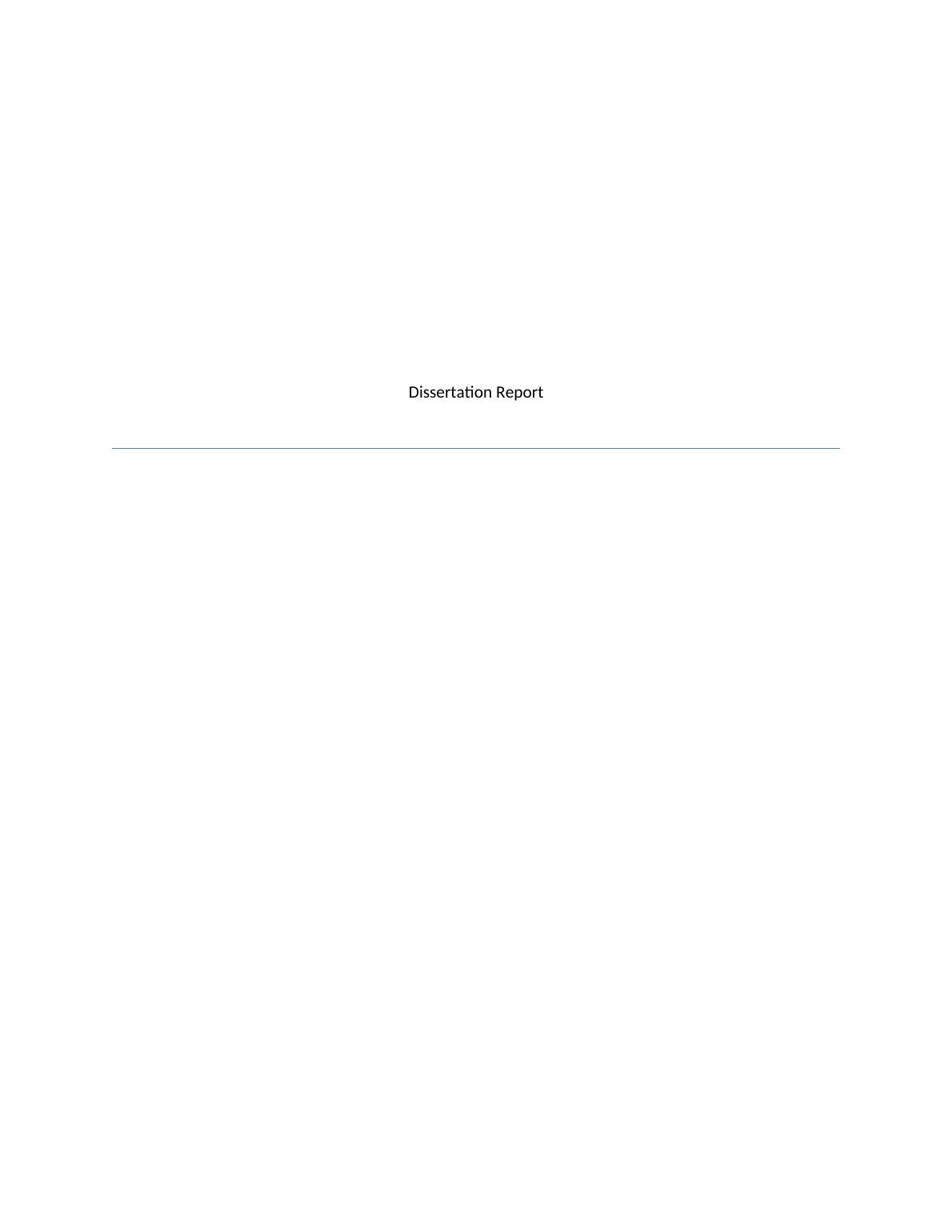
Executive Summary
In this research report, the current efforts in the Ghana are analyzed in order to determine the
impact of HERANA project on the current level of education, but there are various issues such as
sources of funding, infrastructure development, and others that impact on the current level of
higher education in Ghana. The research objective of the study is to determine the current level
of education in Ghana, to inquire the current effort that provides accessible and affordable higher
education in Ghana and develop a case study of its objective, process, and current impact. The
aim of the study is to determine the impact of HERANA project on the affordability and
accessibility of higher education in Ghana. The research methodology is quantitative research
method which is used to collect the data through questionnaire as a data collection tool and data
is analyzed through using MS Excel which shows that the current efforts of HERANA project
are improving the affordability and accessibility of higher education in Ghana but still various
initiatives are required in order to improve the higher education system in Ghana.
In this research report, the current efforts in the Ghana are analyzed in order to determine the
impact of HERANA project on the current level of education, but there are various issues such as
sources of funding, infrastructure development, and others that impact on the current level of
higher education in Ghana. The research objective of the study is to determine the current level
of education in Ghana, to inquire the current effort that provides accessible and affordable higher
education in Ghana and develop a case study of its objective, process, and current impact. The
aim of the study is to determine the impact of HERANA project on the affordability and
accessibility of higher education in Ghana. The research methodology is quantitative research
method which is used to collect the data through questionnaire as a data collection tool and data
is analyzed through using MS Excel which shows that the current efforts of HERANA project
are improving the affordability and accessibility of higher education in Ghana but still various
initiatives are required in order to improve the higher education system in Ghana.
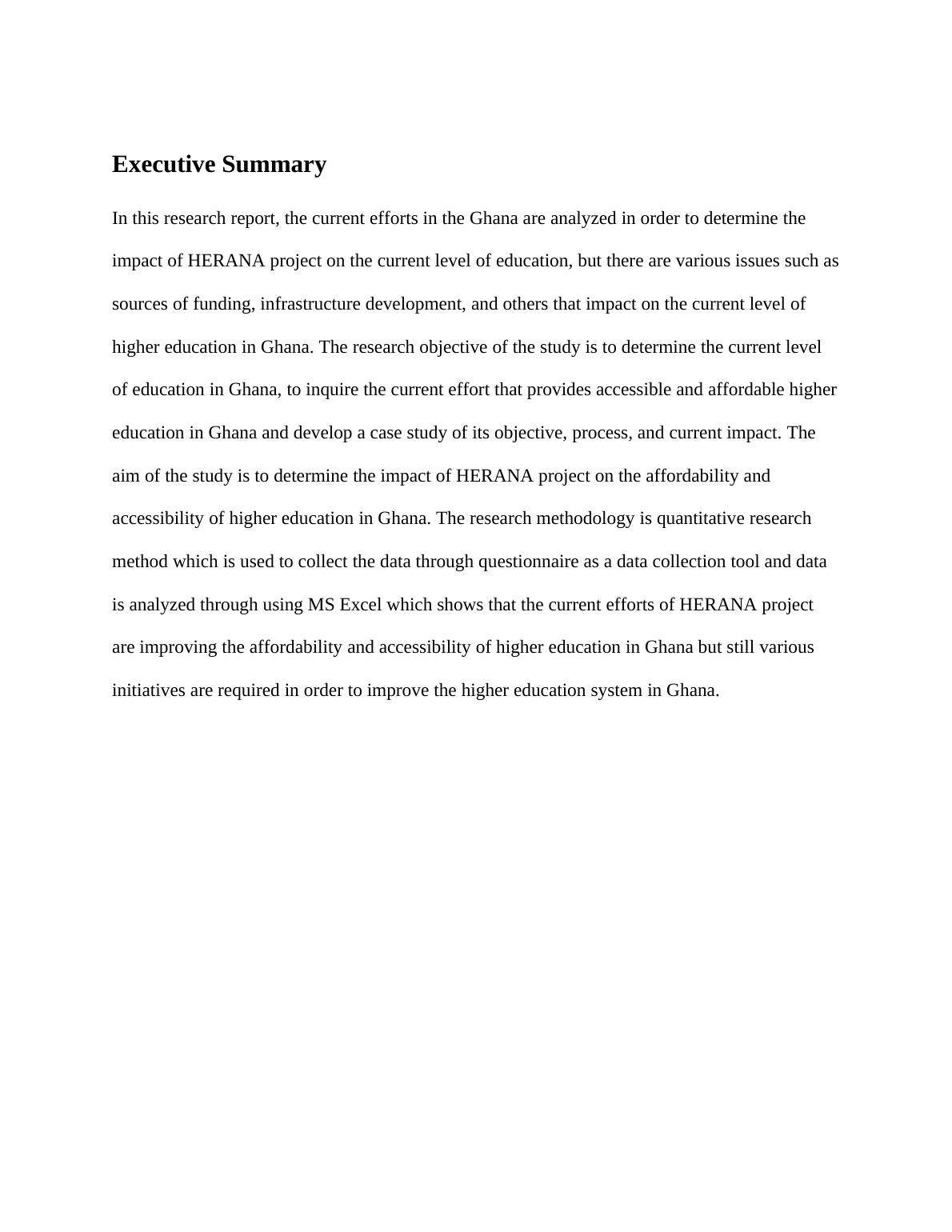
Table of Contents
Executive Summary.........................................................................................................................1
Chapter-1.........................................................................................................................................4
Introduction......................................................................................................................................4
Research objective...........................................................................................................................6
Aim of study.................................................................................................................................6
Background and context of the study...........................................................................................7
Statement of the research problem...............................................................................................7
Definition of key terms and concepts..........................................................................................8
Assumptions.................................................................................................................................8
Summary......................................................................................................................................8
Chapter-2.......................................................................................................................................10
Literature Review..........................................................................................................................10
Introduction................................................................................................................................10
The condition of education in Ghana.........................................................................................10
The role of higher education in Ghana.......................................................................................10
Efforts by government to provide accessible and affordable higher education in Ghana.........11
Education Strategic Plan........................................................................................................11
National Science, Technology and Innovation Policy...........................................................12
Role of higher education in Ghana can be understood from the perspective of institutional
stakeholders................................................................................................................................13
Efforts by university to provide accessible and affordable higher education in Ghana............13
Initiatives around teaching and learning................................................................................13
The Higher Education and Economic Development project.....................................................14
Financing of higher education in Ghana....................................................................................16
Regulatory framework...............................................................................................................16
Constraints limiting STI application in Ghana..........................................................................16
Conclusion.................................................................................................................................16
Chapter-3.......................................................................................................................................17
Research Methodology..................................................................................................................17
Executive Summary.........................................................................................................................1
Chapter-1.........................................................................................................................................4
Introduction......................................................................................................................................4
Research objective...........................................................................................................................6
Aim of study.................................................................................................................................6
Background and context of the study...........................................................................................7
Statement of the research problem...............................................................................................7
Definition of key terms and concepts..........................................................................................8
Assumptions.................................................................................................................................8
Summary......................................................................................................................................8
Chapter-2.......................................................................................................................................10
Literature Review..........................................................................................................................10
Introduction................................................................................................................................10
The condition of education in Ghana.........................................................................................10
The role of higher education in Ghana.......................................................................................10
Efforts by government to provide accessible and affordable higher education in Ghana.........11
Education Strategic Plan........................................................................................................11
National Science, Technology and Innovation Policy...........................................................12
Role of higher education in Ghana can be understood from the perspective of institutional
stakeholders................................................................................................................................13
Efforts by university to provide accessible and affordable higher education in Ghana............13
Initiatives around teaching and learning................................................................................13
The Higher Education and Economic Development project.....................................................14
Financing of higher education in Ghana....................................................................................16
Regulatory framework...............................................................................................................16
Constraints limiting STI application in Ghana..........................................................................16
Conclusion.................................................................................................................................16
Chapter-3.......................................................................................................................................17
Research Methodology..................................................................................................................17
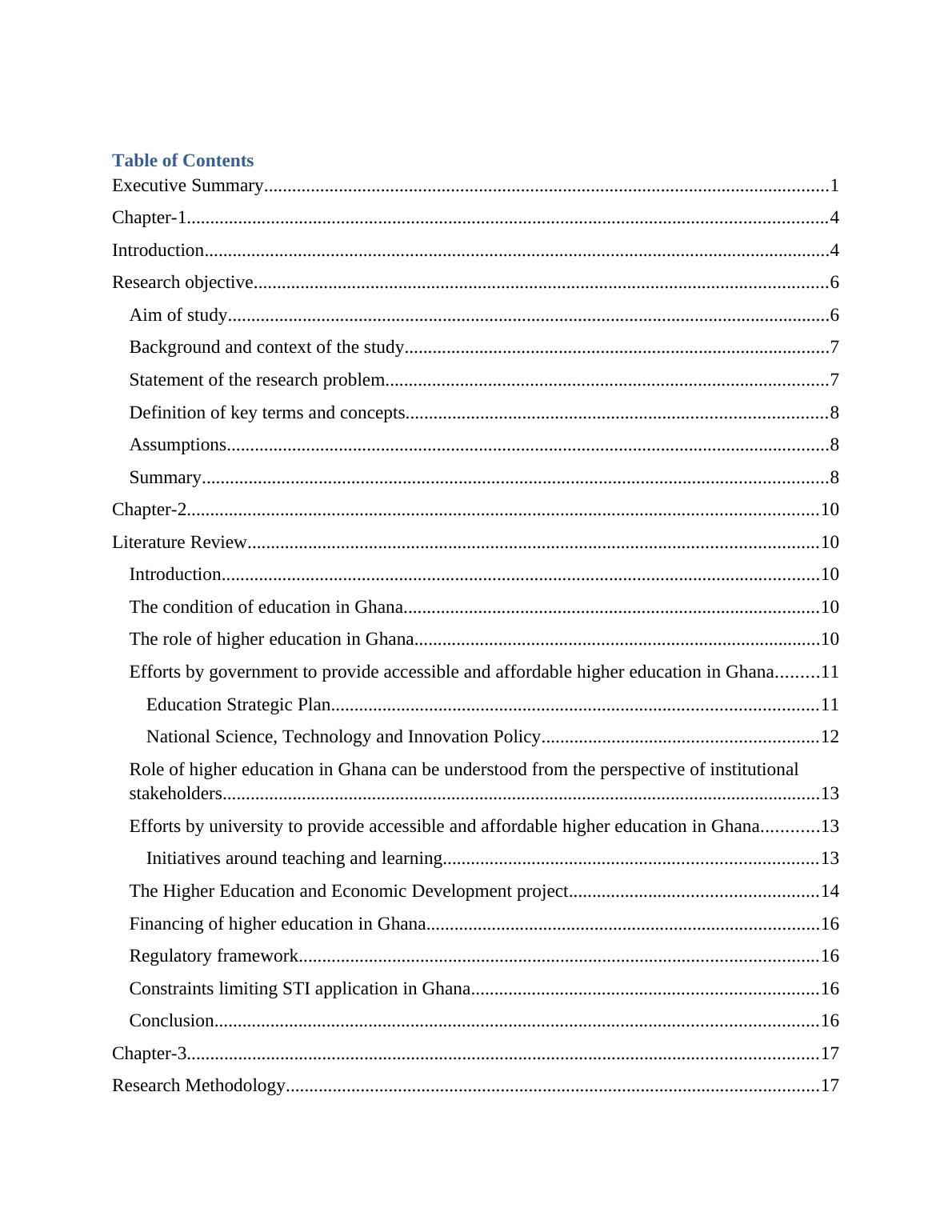
Research Objectives...................................................................................................................17
Research Design.........................................................................................................................17
Research Framework and Methods............................................................................................18
Sample........................................................................................................................................19
Participants.................................................................................................................................19
Methods of Data Generation......................................................................................................19
Analysis of Data.........................................................................................................................20
Limitations of the study.............................................................................................................20
Chapter-5.......................................................................................................................................21
Results and Findings......................................................................................................................21
Data analysis..............................................................................................................................32
Summary....................................................................................................................................33
Chapter-5.......................................................................................................................................34
Recommendation...........................................................................................................................34
Overview of the study................................................................................................................35
Implications................................................................................................................................36
Recommendations for practice...................................................................................................36
Recommendations for future research.......................................................................................37
Conclusion.....................................................................................................................................37
Appendix........................................................................................................................................39
References......................................................................................................................................41
Research Design.........................................................................................................................17
Research Framework and Methods............................................................................................18
Sample........................................................................................................................................19
Participants.................................................................................................................................19
Methods of Data Generation......................................................................................................19
Analysis of Data.........................................................................................................................20
Limitations of the study.............................................................................................................20
Chapter-5.......................................................................................................................................21
Results and Findings......................................................................................................................21
Data analysis..............................................................................................................................32
Summary....................................................................................................................................33
Chapter-5.......................................................................................................................................34
Recommendation...........................................................................................................................34
Overview of the study................................................................................................................35
Implications................................................................................................................................36
Recommendations for practice...................................................................................................36
Recommendations for future research.......................................................................................37
Conclusion.....................................................................................................................................37
Appendix........................................................................................................................................39
References......................................................................................................................................41
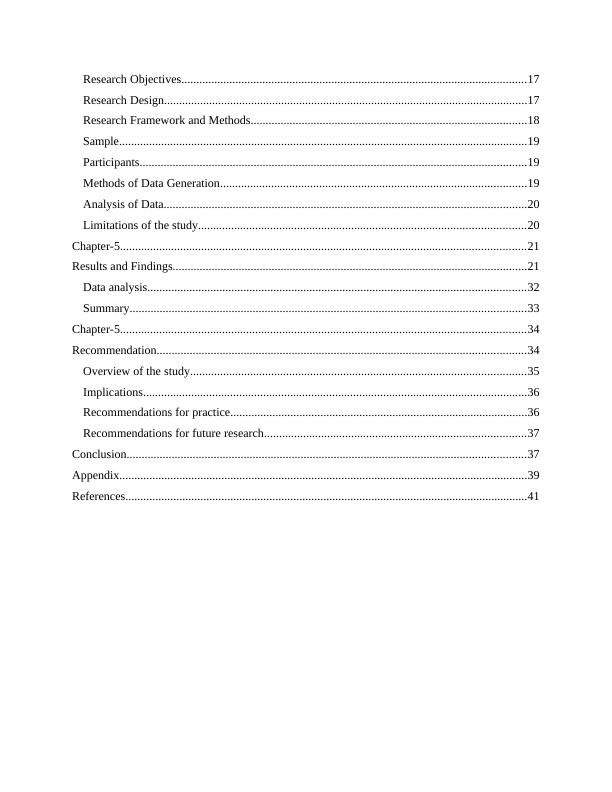
Chapter-1
Introduction
The focus of the study is to understand the impact of current efforts in the Ghana which provides
accessible and affordable higher education. The sources of funding are the major issue in the
accessibility of higher education in Ghana, so the current effort of the government is to provide
the sources of funding for higher education which enables to facilitate the higher education for
students in Ghana. The funding policies are the current efforts which are done by the government
in order to facilitatehigher education in Ghana. The policies are a hypothesis in which the
designed plan shows the hypothesis of conversion of hypothesis into the government action. The
policy reforms and the formulation of new policies have transformed the higher education with
the aim of pointing various issues and challenges faced in the accessibility of higher education in
Ghana. The policies have been developed in the various areas of higher education which enables
to provide funding facilities in order to ensure the smooth running of the entire higher education
system. For example, policies are designed in order to ensure the quality of higher education.
The
The various other efforts are currently taking place in the Ghana such as the development of
universities, educational programs by the government and others.The HERANA (Higher
education and economic development) is the program which was established in 2007 in order to
research on the higher education and advocacy network in Africa. It is coordinated by the high
education transform. The higher education masters in Africa program is the capacity building
component of HERANA which contributes towards the strengthening of higher education in
Introduction
The focus of the study is to understand the impact of current efforts in the Ghana which provides
accessible and affordable higher education. The sources of funding are the major issue in the
accessibility of higher education in Ghana, so the current effort of the government is to provide
the sources of funding for higher education which enables to facilitate the higher education for
students in Ghana. The funding policies are the current efforts which are done by the government
in order to facilitatehigher education in Ghana. The policies are a hypothesis in which the
designed plan shows the hypothesis of conversion of hypothesis into the government action. The
policy reforms and the formulation of new policies have transformed the higher education with
the aim of pointing various issues and challenges faced in the accessibility of higher education in
Ghana. The policies have been developed in the various areas of higher education which enables
to provide funding facilities in order to ensure the smooth running of the entire higher education
system. For example, policies are designed in order to ensure the quality of higher education.
The
The various other efforts are currently taking place in the Ghana such as the development of
universities, educational programs by the government and others.The HERANA (Higher
education and economic development) is the program which was established in 2007 in order to
research on the higher education and advocacy network in Africa. It is coordinated by the high
education transform. The higher education masters in Africa program is the capacity building
component of HERANA which contributes towards the strengthening of higher education in
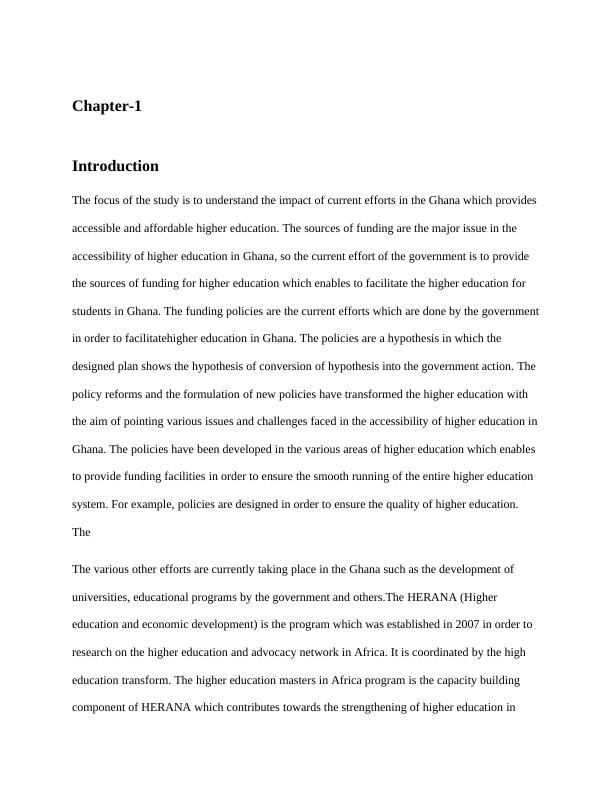
Africa. The research component of the program contributes towards the research of higher
education in Ghana. The HERANA is funded by the various organizations such as the Ford
foundation, the Rockefeller foundation, Carnegie Corporation of New York, the Kresge
foundation. The funding of Higher education masters in Africa program is done by NORAD.
The project focus on the complex links between the economic development and higher education
in Africa. The objectives of HERANA include evidence-based information related to the higher
education and the working of high education sector; link the network of African higher education
with other international groups, sharing of capacity building of inter-disciplinary higher
education in a network of researchers and senior researchers. The multiple sources of funding
facilitate higher education in Ghana. The South African funding system is implemented in the
national policy which facilitates higher education and the higher education policies has taken
into consideration equitability, democracy and integrate economic development because it is
considered as the major concern for the development of the general people in Ghana. According
to the research, there is a complexity between the Centre for education policy development and
Democratic university staff association, but they are trying to achieve the targets in order to
facilitate higher education in Ghana.
The planned and systematic review programs are introduced by the government in order to
review the standard of education, teaching, administration, scholarship and infrastructure which
enable to provide a high quality of education in Ghana. The role of universities plays an
important role in providing higher education in Ghana which enables to develop the economy by
increasing the literacy rate of people in Ghana. According to the Varghese et al., 2013 the public
sector institutions and state plays a central role in providing higher education in Ghana through
developing the strategy which enhances the higher education in an efficient and effective
education in Ghana. The HERANA is funded by the various organizations such as the Ford
foundation, the Rockefeller foundation, Carnegie Corporation of New York, the Kresge
foundation. The funding of Higher education masters in Africa program is done by NORAD.
The project focus on the complex links between the economic development and higher education
in Africa. The objectives of HERANA include evidence-based information related to the higher
education and the working of high education sector; link the network of African higher education
with other international groups, sharing of capacity building of inter-disciplinary higher
education in a network of researchers and senior researchers. The multiple sources of funding
facilitate higher education in Ghana. The South African funding system is implemented in the
national policy which facilitates higher education and the higher education policies has taken
into consideration equitability, democracy and integrate economic development because it is
considered as the major concern for the development of the general people in Ghana. According
to the research, there is a complexity between the Centre for education policy development and
Democratic university staff association, but they are trying to achieve the targets in order to
facilitate higher education in Ghana.
The planned and systematic review programs are introduced by the government in order to
review the standard of education, teaching, administration, scholarship and infrastructure which
enable to provide a high quality of education in Ghana. The role of universities plays an
important role in providing higher education in Ghana which enables to develop the economy by
increasing the literacy rate of people in Ghana. According to the Varghese et al., 2013 the public
sector institutions and state plays a central role in providing higher education in Ghana through
developing the strategy which enhances the higher education in an efficient and effective
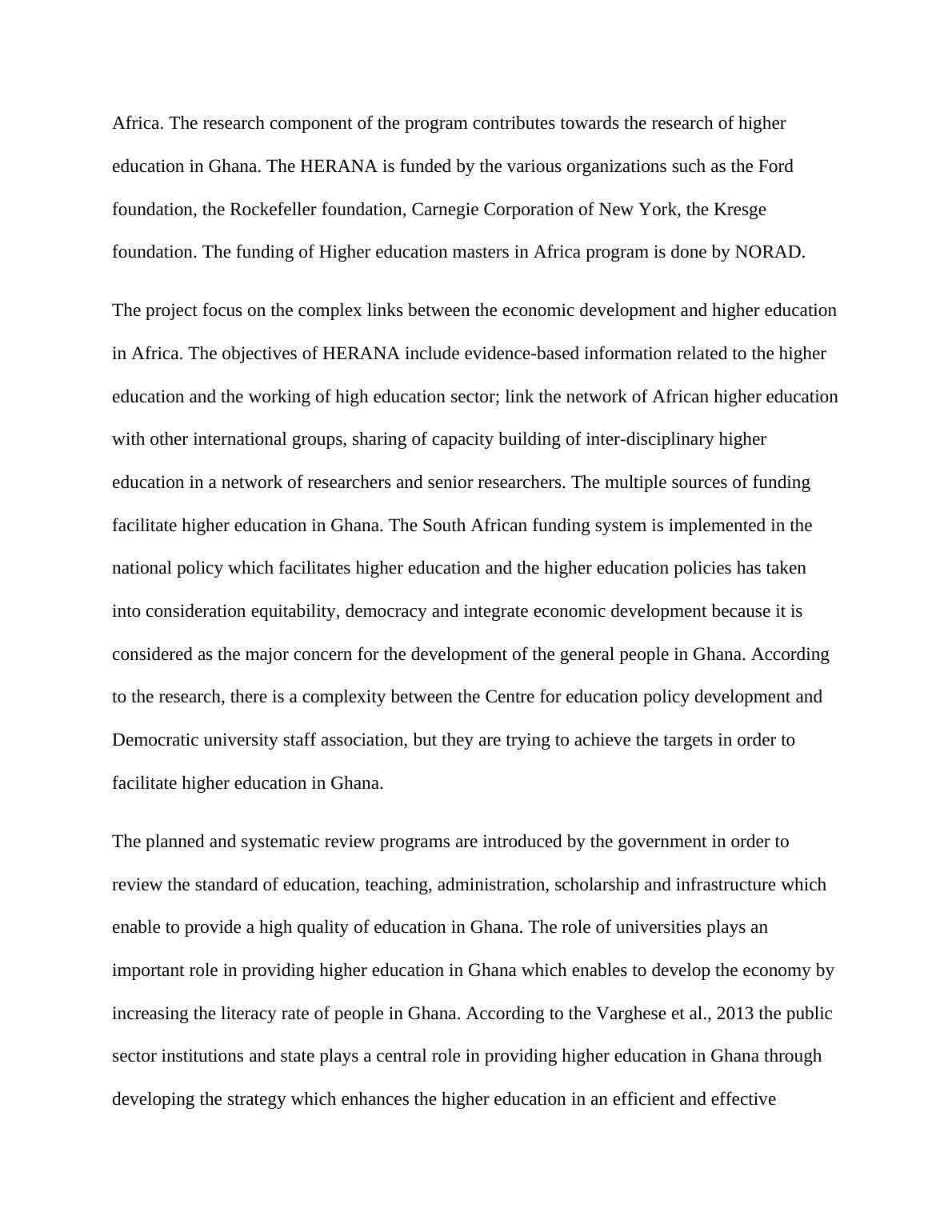
manner. The higher education is provided by universities. In the 1960s and 1970s, many
universities are established in the Africa which supports higher education in Ghana, and the
public universities in these countries are the symbol of self-respect and national pride. The
expansion in the higher education provides aspiration of political and economic of the newly
independent government. The government was willing to invest in the higher education which
provides the facilities for development in Ghana. In the twenty-one century, the role is centrally
managed by the universities in order to provide higher education. Since after that the sector is
tremendously expanded in the past few years. The sector of higher education attracts a large
number of stakeholders due to which the higher education plays an important role in the
transformation of Ghana. However, there are still various challenges which are faced in by the
higher education sector such as funding, the concern of quality, poor research base and
institution capabilities and others.
There are many revolutionary changes which took place in the higher education globally which
impacts on, the higher education of Africa. The internationalism impacts on the activities of
higher education in Ghana which enables to shape the higher education in the 21st century. It is
the major force on the higher education which results in various opportunities, challenges, and
risk which demands in-depth analysis and understandings. The role of higher education in Africa
is not contestable in the sustainable political, social and economic development. The sector is
struggling due to inadequate capacity and few resources due to which it is difficult to respond to
the increasing demand.
The various challenges are faced in the development of higher education in Ghana which has
pertinently threatened the socio-economic wellbeing. The summarization of challenges was
shown within the Millennium development goals. According to the African progress report, 2012
universities are established in the Africa which supports higher education in Ghana, and the
public universities in these countries are the symbol of self-respect and national pride. The
expansion in the higher education provides aspiration of political and economic of the newly
independent government. The government was willing to invest in the higher education which
provides the facilities for development in Ghana. In the twenty-one century, the role is centrally
managed by the universities in order to provide higher education. Since after that the sector is
tremendously expanded in the past few years. The sector of higher education attracts a large
number of stakeholders due to which the higher education plays an important role in the
transformation of Ghana. However, there are still various challenges which are faced in by the
higher education sector such as funding, the concern of quality, poor research base and
institution capabilities and others.
There are many revolutionary changes which took place in the higher education globally which
impacts on, the higher education of Africa. The internationalism impacts on the activities of
higher education in Ghana which enables to shape the higher education in the 21st century. It is
the major force on the higher education which results in various opportunities, challenges, and
risk which demands in-depth analysis and understandings. The role of higher education in Africa
is not contestable in the sustainable political, social and economic development. The sector is
struggling due to inadequate capacity and few resources due to which it is difficult to respond to
the increasing demand.
The various challenges are faced in the development of higher education in Ghana which has
pertinently threatened the socio-economic wellbeing. The summarization of challenges was
shown within the Millennium development goals. According to the African progress report, 2012
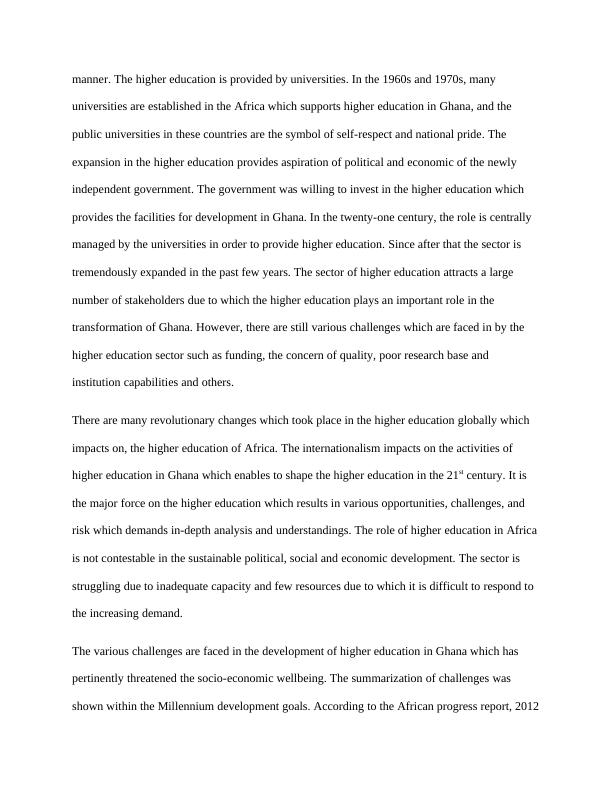
it is shown that the progress is being made towards the attainment of the Millennium
development goals in which the gains in education, disease survivors against malaria and HIV,
and child survival has been improved. However, the overall progress remains slow, and many
citizens are still in the trap of poverty due to which there is a level of inequality in the across the
Africa.
The project starts with the review of international literature on the relationship between
economic development and higher education which is followed by the three case studies of three
systems that had successfully linked the higher education policy and economic development in
three states, namely, South Korea, Finland and North Carolina. The analytical framework of the
project the universities are considered as the institution for the production of high-level skills and
the innovation of knowledge, and it is based on the traditional core business. In the government
knowledge policies, the higher education is one of the important areas. It shows that the political
actors are more interested in the higher education than the socio-economic stakeholders. It raises
the issues of system and the coordination level of knowledge with the adequate structure within
the political system. The research group has taken three case studies in the development of
national strategy in order to enhance the higher education by understanding the complex
relationship between the higher education and economic development. The project is not
attempting various aspects such as the evaluation of universities in the development of the
countries, assessment of the impacts of policies, examination of external donors in the
development of universities, and primary role of higher education in the development.
The universities conditions contribute towards the development of the economies by facilitating
higher education to the students in Ghana. The universities can also take participation in the
global knowledge economy and made a contribution in a sustainable manner if the core of
development goals in which the gains in education, disease survivors against malaria and HIV,
and child survival has been improved. However, the overall progress remains slow, and many
citizens are still in the trap of poverty due to which there is a level of inequality in the across the
Africa.
The project starts with the review of international literature on the relationship between
economic development and higher education which is followed by the three case studies of three
systems that had successfully linked the higher education policy and economic development in
three states, namely, South Korea, Finland and North Carolina. The analytical framework of the
project the universities are considered as the institution for the production of high-level skills and
the innovation of knowledge, and it is based on the traditional core business. In the government
knowledge policies, the higher education is one of the important areas. It shows that the political
actors are more interested in the higher education than the socio-economic stakeholders. It raises
the issues of system and the coordination level of knowledge with the adequate structure within
the political system. The research group has taken three case studies in the development of
national strategy in order to enhance the higher education by understanding the complex
relationship between the higher education and economic development. The project is not
attempting various aspects such as the evaluation of universities in the development of the
countries, assessment of the impacts of policies, examination of external donors in the
development of universities, and primary role of higher education in the development.
The universities conditions contribute towards the development of the economies by facilitating
higher education to the students in Ghana. The universities can also take participation in the
global knowledge economy and made a contribution in a sustainable manner if the core of
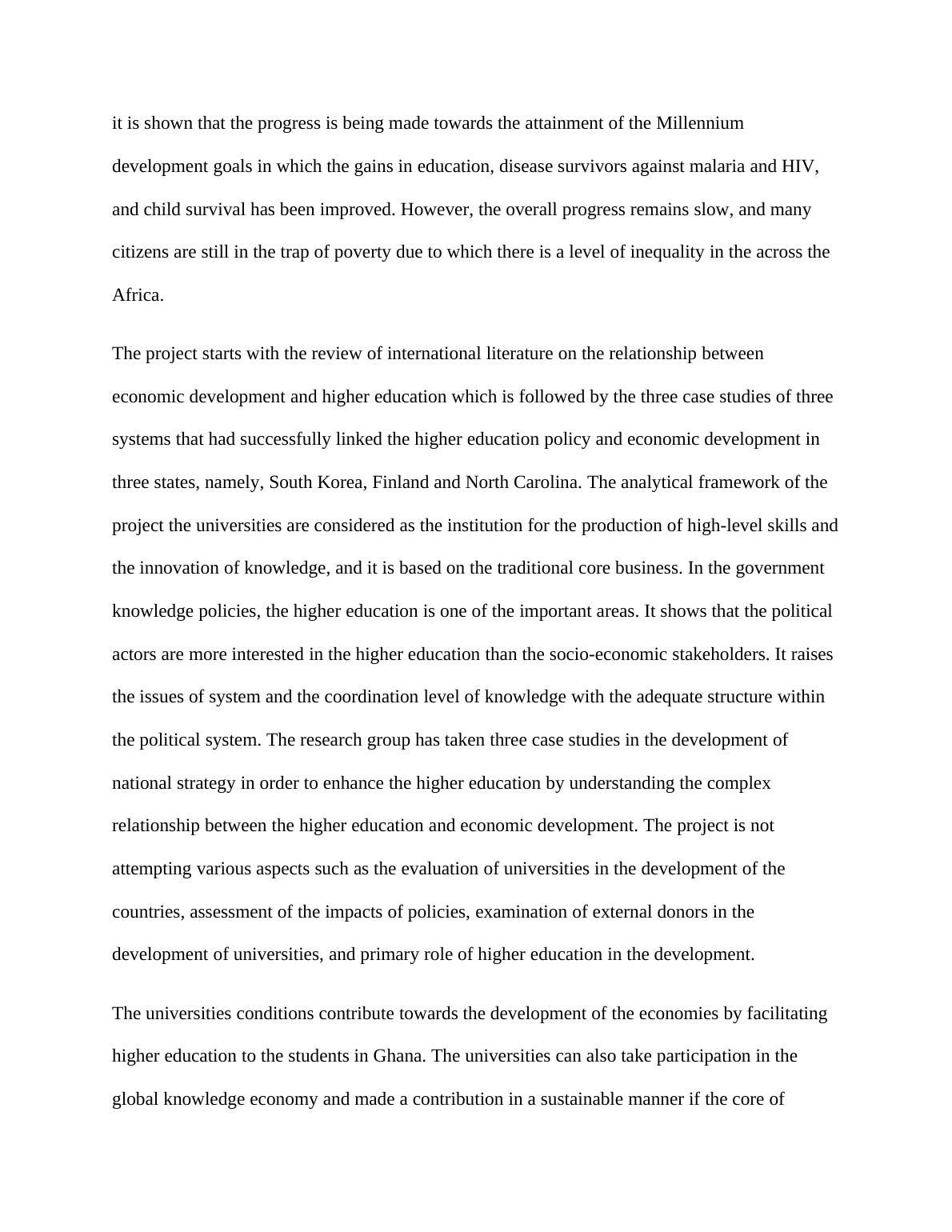
End of preview
Want to access all the pages? Upload your documents or become a member.
Related Documents
Study of Higher Education in Ghanalg...
|27
|8122
|59
Determinants of Credit Access for SMEs in Ga East Municipalitylg...
|40
|14424
|453
XXX in China: Marketing Strategies for Expansionlg...
|68
|16736
|25
Higher Education in Ghana Research Studylg...
|6
|889
|568
The Shades – Hair and Beauty Salon Business Planlg...
|56
|14153
|1574
Cultural Influence on Obesity BAME Group Adultslg...
|41
|11996
|79